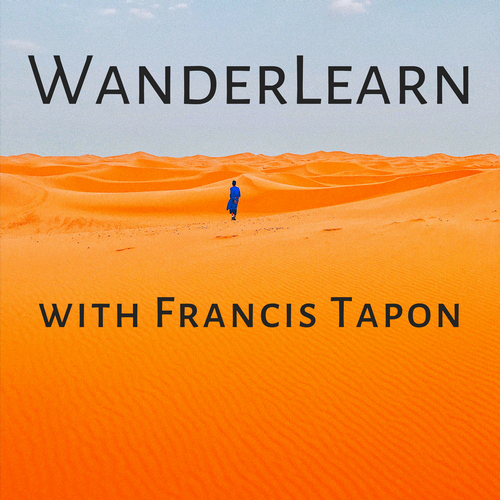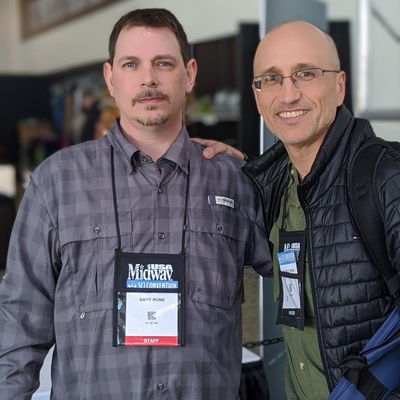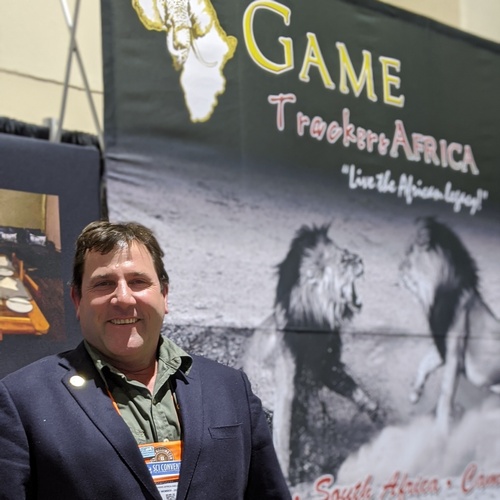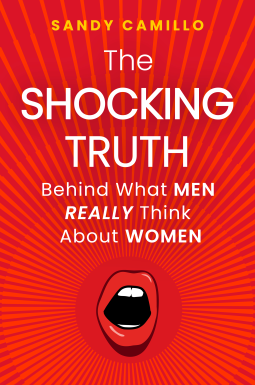WanderLearn Podcast

Check out the latest WanderLearn episodes!
Take a profound and distant journey. Call it:
- Deep Travel
- Immersive Travel
- Slow Travel
- Vagabonding
I will guide you to the intersection of travel, technology, and transformation.
The WanderLearn podcast will compel you to go beyond your comfort zone.
I wander all over the world and I share what I learn with you! In so doing, I hope you'll be inspired to do the same. Travel is the best university.
How to Subscribe to the WanderLearn Podcast
Search for "WanderLearn" in your favorite podcast player.
 If that fails:
If that fails:
This email address is being protected from spambots. You need JavaScript enabled to view it. the details of the podcast player that failed to find the show.- While I fix the problem, copy and paste this feed into your favorite podcast player:
https://wanderlearn.com/feed.xml
Although subscribing is essential, two other things help the WanderLearn podcast:
- Download every WanderLearn episode as I produce them! That's what helps get it noticed! It's better to have 100 subscribers and 100,000 downloads per episode than 10,000 subscribers and 100 downloads.
- Share the episodes! Word of mouth is gold!
Get My Infrequent Newsletter!
Don't just listen, watch!
Some WanderLearn episodes will also be videos, so be sure to subscribe to my YouTube Channel too.
I welcome comments and questions for each episode, which are listed below, from the most recent to the first one. I promise to answer any question from one of my Patrons. That's just one way to get rewarded for supporting the show!
Listen to the latest episodes below!
The show notes and comments for each episode are below

At SCI, I interviewed Garry Roone, a digital artist.
He's been doing art for 30 years.
Over 15 minutes, I ask him:
- How did Roone start doing art?
- How does Roone deal with the lack of inspiration?
- What does he think of crypto kitties and blockchain art?
- How does he deal with the piracy of digital art?
- Where will he take his art in 10 years?
Background on Garry
- Since 1986, Garry has been working as a professional illustration artist in the apparel industry.
- In 2013, Garry formed Still Water Design Solutions and from that point to the present, is working as a free agent illustrator.
- Garry has become known for a signature style of artwork that is hand-drawn and organic, and also for being a specialist in the apparel industry.
- For a nationally televised NASCAR event in October 2019, Garry's illustrations were used to completely wrap a car owned by Rick Ware Racing.
- In January 2019, Garry began implementing the addition of new equipment and software to create art assets for virtual reality.
- Garry's skills are multi-faceted including illustration, concept design, brand development, and painting. Additionally, new skills are being acquired through the development of VR asset creation and exploring the potential of creating art by hand in VR.

Gary Arndt has a new podcast called Everything Everywhere Daily.
I highly recommend subscribing to it.
I talk with Gary about:
- How does he come up with topics to discuss
- Why he doesn't do 3-minute podcasts (but he usually keeps it under 10 minutes)
- Where does Nike's "Just Do It" slogan come from
- Which are his most popular podcasts?
- How GPS works
- What are his 2021 travel plans
Listen to my two other podcasts with Gary:
.be
Kyle and Leanne Huebner did what few large families dare to do: embark on a one-year world tour.
COVID-19 cut their journey short by three months, but they still walked away with plenty of experiences and lessons.
They share much on their detailed blog, Global Teen Adventures.
We discuss the key questions you may have:
- How did they pick the 43 countries they ended up going to?
- How did they manage to book flights for 7 when the max is usually 6?
- What lessons did they learn?
- What did they pack?
- How did their packing strategy evolve?
- How did COVID-19 impact them?
- Where do they plan to go next?
Sponsor: Sawyer

Jaco Oosthuizen attended the Safari Club International show 22 years in a row.
In 2020, he was named The Hunter of the Year.
I ask Jaco Oosthuizen:
- How have things have changed for hunters since the previous century?
- Does hunting have a place in the 21st century or is it outdated?
- Why do poachers poach?
- What does he do that other hunters don't do?
- Why do hunters only target old males? Why not hunt old females too?
- Why can't we convert all the hunting zones into photographic safari zones?
- Will hunting still exist in the next 50 years?
Hear his answers in this 30-minute interview:
Here are my other hunting-related podcasts.

About six months ago, Underknown's What If channel hired me to interview two prominent NASA astrophysicists. They wanted to find out what would happen if Earth became one of Jupiter's moons.
I'm unsure why they wanted to know that since Underknown had already produced a video that answered that topic, but I adore astronomy, so I was happy to visit my old stomping ground: the NASA Ames Research Center.
Underknown said that this was urgent, so I did everything I could to interview two top astrophysicists with almost no warning.
Unfortunately, six months later, they still haven't released the video I shot. I knew they would only use a snippet of what I filmed, but still. Nada.
And it's not because I shot a crappy video. Underknown hired me a couple of months later for another project, so I couldn't have screwed things up too badly the first time.
I feel terrible that these two astrophysicists complied with my last second request and I haven't had anything to show them.
Six months ago, I shared the audio and video podcast with my Patrons. It's an exclusive group, so I figured that Underknown wouldn't notice or care.
I never planned to share it on the WanderLearn podcast.
However, now that Underknown has done nothing with the content for 6 months, I think it's time that the general public enjoys this conversation.
I'm doing this as a public service. I'm not taking any ads for this episode.
My voice wasn't supposed to appear in the final cut, so that's why my voice rarely appears, and, when it does, it's distant.
You should watch this video by Underknown:
In this episode, you'll hear from the world-renowned NASA astrophysicist Jack Lissauer.

It's a perverse question, but what's an acceptable number of unarmed people that the police may accidentally shoot every year?
Of course, many people's knee-jerk answer will be, "Zero!"
If you answered that way, it's time to take a deep breath and relax.
We're going to embark on a cold-hearted exercise that requires rationality, logic, and a heavy dose of realism. The implications are profound and important, so please bear with me.
After reading this long article, you're welcome to write a constructive comment at the bottom. Include what you think is a reasonable number of annual unarmed deaths and why. I will update this article as I get thoughtful and intelligent feedback.
Listen to this article
This is an 8,600-word article I wrote in 2020, during the George Floyd protests. Although there are some useful graphs and videos, some people might prefer listening to the article. That's why I included it on my WanderLearn podcast.
The Black Lives Matter Thesis
A central argument in the Black Lives Matter movement is that (white) cops are disproportionately killing Black men, especially unarmed Black men. It's Exhibit A in a long list of exhibits that prove systemic, structural, and institutional racism in America's police.
This argument has been repeated so many times that it has become an axiom. Thus, questioning the Black Lives Matter thesis is tantamount to questioning whether our planet revolves around the sun.
We won't question it. Instead, we will seek to quantify it.
Metrics: Quantifying success and failure
Metrics allow us to objectively measure the size of a problem. Metrics help us measure our progress.
Metrics also help us answer crucial questions: When can we declare victory? When will we know that we've solved this crisis?
In other words, when can we put down our signs, stop protesting, hug, give high-fives, and scream, "Mission accomplished!"?
Declaring victory ought to be based on facts and evidence, not a group's feelings or one man's opinion.
Therefore, we must set reasonable benchmarks.
We must quantify where we want to be. What does a fair and just world look like, numbers-wise?
Assuming the current number of police killings of Blacks is disproportionately high, then what number would be disproportionately low?
And what number would be tragic, but understandable?
To understand what I mean, consider other tragic numbers. Every year, hundreds of babies die at daycare centers, thousands die in traffic accidents, and millions die of preventable diseases.
Since society is not vigorously protesting all these deaths, one could conclude that these deaths, while sad, are understandable. Our society deems that all those preventable deaths are tragic but tolerable.
Therefore, this article aims to help you calculate 3 numbers regarding the number of US police killings of unarmed victims:
- A shockingly high number that warrants protest.
- An expected number that we can live with and accept begrudgingly.
- A remarkably low number that's almost worth celebrating.
Great. Now let's analyze the data.
- What If Earth Orbited Jupiter? A NASA Astrophysicist Answers
- 100th Episode! Special AMA!
- Reflections on COVID-19's 650,000 Deaths Worldwide
- Hunting Myths - Brittany Longoria Explains
- Peer-to-peer lending with Constant using cryptocurrency
- How Anti-Poaching Is Different Than Counter-Poaching
- Travel By Living Abroad with Traveling Mitch
- Our Future Brains and Countries
- Forrest Fenn's Treasure Found in the Rocky Mountains
- Debating UFOs, Aliens, Crop Circles, and the Supernatural
- Is the Widespread Destruction and Theft Justified? #GeorgeFloyd
- Riots in Minneapolis - Gary Arndt reports from his hometown
- Zen Pilot Is Flying From Pole to Pole
- Why is Bitcoin Worth Anything?
- 80,000 COVID vs. 80,000 Flu Deaths
- 8 Flaws in Bitcoin's Stock-to-Flow Model Will Doom It
- Gold Expert On Bitcoin, Stock-To-Flow, Asteroids, Depression
- Bitcoin vs. Other Cryptocurrencies
- Solving the Coronavirus Crisis
- Don't Hike Your Own Hike in 2020
- Thru-Hike To Escape the Coronapocolypse
- Don't Worry Too Much About COVID-19 and the Coronapocolypse
- Running 30 Marathons Before Turning 30 - Liz Warner
- Overlanding in 35 African countries in 3 years - Dan Grec
- How To Travel When You Have Limited Time
- Answering Kidnapping Podcast Criticisms
- Traveling To Find One's Ancestors
- Being Russian in Estonia
- How To Housesit When You Travel
- Backpacking With Zpacks - Matt Favero Shares The Vision
- How To Take A Sabbatical - DJ Didonna
- Traveling for 30+ Years - Mike Spencer Bown
- How Home Exchanges Work
- Alternatives to the Main El Camino de Santiago - Susan Alcorn
- Life Lessons From A Lion Tracker - Boyd Varty
- How to Avoid or Survive a Kidnapping
- Being A California Mayor: Burlingame's Donna Colson
- Eradicating Malaria in Sumbawa, Indonesia and Beyond
- How To Avoid and Survive an Avalanche
- Touring the World with Jessica Husson
- How Does A Colonial Ghost Haunt Africa's Borders?
- How To Travel Responsibly and Ethically
- Algerians Reveal Their Unseen Sides
- Humans Are Part Of Nature Despite What Environmentalists Say
- The Unseen Egypt with High-End Journeys
- AMA About the Book, Jail, and Languages
- Biking To Over 150 Countries with Patrick Martin Schroeder
- Using Basketball To Connect With Africans
- Biking The Americas From Canada To Patagonia
- Running An Egyptian Luxury Hotel With A Casino Is Tricky
- Debating Environmentalism
- AMA #2 - Bitcoin Q&A
- Unseen Sides of Tanzania
- Hiking to Muxia on El Camino de Santiago
- Traveling To Every Country With 3 Kids
- How Blockchains Will Disrupt Everything - Stephen P. Williams
- The Smartest Guy In Cameroon - Africa's Einstein
- 3 Young Egyptians In Luxor
- Lessons from the Hunting Debate
- Brittany Longoria Explains Her Controversial Leopard Photo
- Are Hunters Responsible for the Decline of Africa's Wildlife?
- How Volara is Bringing Voice Assistants to Hotels
- Gossamer Gear's Founder Glen Van Peski on Backpacking
- Is Libya Still A Shit Show? Frederick Wehrey answers
- A Persian Goes To Africa
- When To Use Vacasa
- Do Africans Still Practice Witchcraft Or Is That A Myth?
- How To Make A Successful Documentary Movie About Mountains
- How To Do Good & Make Money in Africa - The Anou
- How Does Nigeria Compare to Other African Countries?
- Rolf Potts on Vagabonding, Souvenirs, and Getting Drunk at 5
- When Will iinside Give Us Intelligent Airports?
- Whether You Love or Hate Travel Tours, Check Out TourRadar
- A 66-year-old Adventurer Shows How To Live A Meaningful Life
- Vacasa Is A Full-Service Solution If You Have A Second Home
- Acting CEO of Rome2Rio Makes Partnership With Lonely Planet
- 7 Predictions For 2019
- JoAnneh Nagler Explains How To Make Money Being An Artist
- Tim Butcher - Author of Two Books on Africa
- AMA: Repairing the Schism Between Locals and Tourists
- How To Create A Top Travel Podcast
- The Winding Tree Foundation Founders Answer Criticism
- How To Use, Not Abuse, Couchsurfing
- Amtrak Travel Tips for 2019
- What To Do If You Can't Afford to Travel
- How To Become an A-list Travel Blogger - Gary Arndt Explains
- You're Wrong If You Think You Don't Have Time to Exercise
- Why You Should Always Read Your Alumni Obituaries
- Winding Tree's Blockchain-Based Technology Impacts Travel
- What It Takes to Set a Speed Record or FKT on the AT & PCT
- How To Accumulate Fuck-You Money So You Can Do Anything
- Travis Sherry, The Jetto App, and Getting Travel Bargains
- Introducing A New Travel Show
- Rick Steves Interviews
Your comment will be deleted if:
- It doesn't add value. (So don't just say, "Nice post!")
- You use a fake name, like "Cheap Hotels."
- You embed a self-serving link in your comment.





